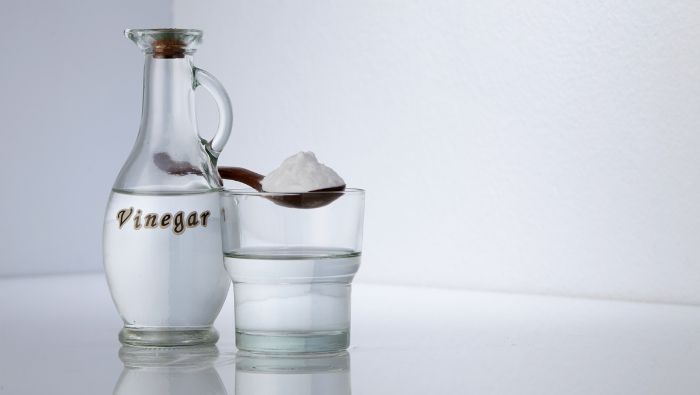Things You Shouldn’t Clean With Vinegar
by Miranda Jackson

If you use vinegar as a primary ingredient in your homemade household cleaners, you may want to use caution on some surfaces.
Although it is best known for its culinary applications, vinegar can also be employed as a natural and cost-effective household solution, from gardening to personal care to cleaning, all while minimizing the use of harsh chemicals and saving you money. In fact, we have several cleaning articles and recipes here on The Dollar Stretcher that call for vinegar.
However, you should avoid using vinegar on some household surfaces or materials. Use caution and do a bit of research before using a homemade cleaner made with vinegar on any of the following:
10 Things You Shouldn’t Clean With Vinegar (or at Least Use Caution)
1. Stone surfaces: Vinegar can etch and damage natural stone surfaces such as granite, marble and limestone due to its acidic nature.
2. Hardwood floors: Using vinegar on hardwood floors can strip off the protective finish and dull the surface over time. (Related: Cleaning Engineered Hardwood Floors on the Cheap.)
3. Electronic devices and screens: The acidity in vinegar can damage sensitive screens and components in electronic devices such as smartphones, tablets, laptops and televisions.
Sign Up for Savings
Subscribe to get money-saving content by email that can help you stretch your dollars further.
Twice each week, you'll receive articles and tips that can help you free up and keep more of your hard-earned money, even on the tightest of budgets.
We respect your privacy. Unsubscribe at any time.
4. Irons: Using vinegar in an iron may damage the internal components, potentially causing it to malfunction.
5. Egg-based stains: Vinegar can cause proteins in egg-based stains to coagulate, making them more challenging to remove. (Related: Inexpensive Homemade Stain Remover Recipes and Remedies.)
6. Aluminum, brass, and cast iron: Vinegar can cause these metals to corrode and tarnish, damaging their appearance and integrity.
7. Waxed furniture and surfaces: Vinegar can strip away the protective wax coating, leaving the surface dull and unprotected.
8. Grout: The acid in vinegar can weaken and break down grout over time, causing it to deteriorate.
9. Some upholstery and fabrics: Vinegar can potentially discolor, stain or weaken certain fabrics, so it’s best to test it on an inconspicuous area first or use a fabric-specific cleaner.
10. Some types of carpets and rugs: Some carpets and rugs can be damaged by the acidity in vinegar, so it’s always best to test a small, hidden area before using vinegar on these materials. (Related: Carpet Stain Removal Tips for Prolonging the Life of Your Carpeting.)
Even Homemade Household Cleaners Can Be Harmful
Vinegar won’t save you much money if it ruins any of the surfaces or fabrics in your home. When in doubt, consult the manufacturer’s care instructions or test a small, inconspicuous area of the surface or material before using vinegar as a cleaning agent.
Reviewed October 2023
Wouldn't you like to be a Stretcher too?
Subscribe to get our money-saving content twice per week by email and start living better for less.
We respect your privacy. Unsubscribe at any time.
Popular Articles
On After50Finances.com
- 9 Things You Need to Do Before You Retire
- You Didn’t Save Enough for Retirement and You’re 55+
- When Empty Nesters Reorganize and Declutter Their Home
- Reinventing Your Career in Your 50s or 60s
- What Mature Homeowners Should Know about Reverse Mortgages
- 2 Reasons to Collect Social Security Benefits As Soon As Possible

